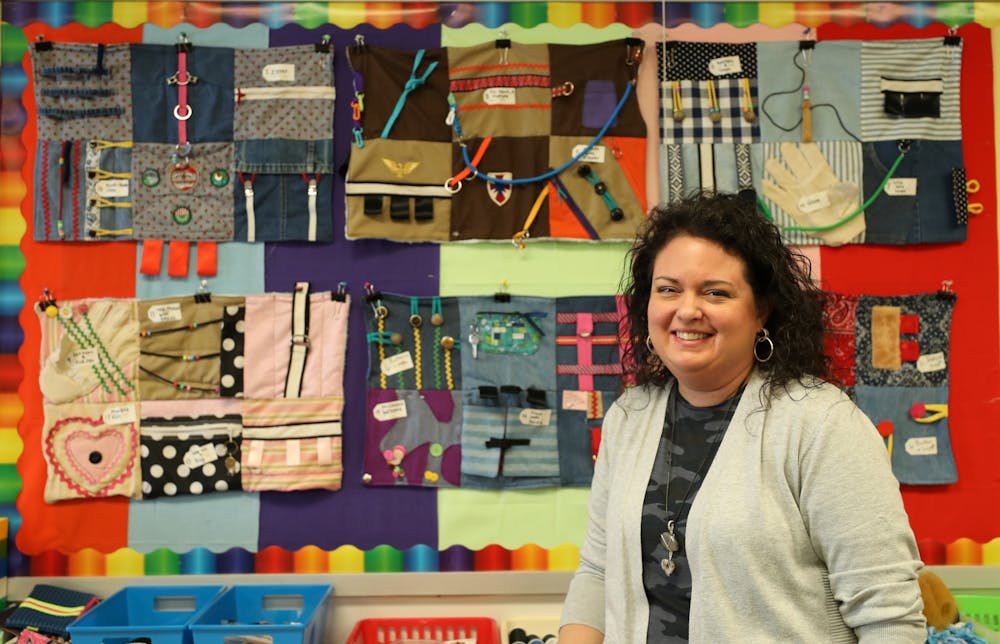Walk into Angela Decker’s classroom, and you’ll see students not sitting at desks listening to a lecture, but singing along to Taylor Swift and sewing washcloths with their hands. One student finishes their project at the start of the class, while another asks Decker for help on how to thread string.
Decker, Delta Middle School family and consumer science teacher, started her career as an English teacher and said she is learning alongside her students this year. Her eighth grade classes are making “fidget quilts'' to be used mostly by people with Alzheimer’s disease, and the quilts students make will be donated to local nursing homes including Liberty Village, Signature HealthCARE, Woodlands, Water’s Edge and Brookside.
“The idea is that [Alzheimer’s patients] just like to mess with things, so undoing buttons and having the textures and the ribbons [is helpful],” Decker said.
Instead of working on the quilts at the beginning of the semester, Decker’s students are focused on smaller projects like washcloths and a pillow to learn the basics of sewing and to keep something of their own.
“A lot of times, kids, especially this age, aren’t sure about giving something away that they’ve made when they made it,” Decker said. “If they have a pillow to take home first, I’m hoping it will be easier to part with [the fidget quilts].”
Decker contacted a program manager from the Alzheimer's Association who plans to talk to the students about Alzheimer’s disease and why fidget quilts are important. The Alzheimer’s Association is a nonprofit with a goal to end Alzheimer’s by accelerating research, driving risk reduction and early detection, and maximizing quality care.
Decker and her class received a $523.16 Robert P. Bell Grant from the Community Foundation of Muncie and Delaware County that made their project possible. She said she is using grant money to buy supplies like buttons, beads and thread, and many people have donated old sewing supplies they no longer use.
Decker’s quilting project qualified for the Bell Grant because it meets the organization's goal to support K-12 classrooms implementing creative and innovative ideas, said Carly Acree-Hill, program officer for the Community Foundation.
A total of 14 grants have been awarded for the 2021-22 academic year, and more applicants are being reviewed. Five grants were awarded this quarter — two to Burris Laboratory School, one to Selma Middle School, one to Indiana Academy of Mathematics, Science and the Humanities, and one to Delta Middle School.
Acree-Hill works directly with the applicants and gives recommendations to the committee. Members then vote on who should be awarded the grants. Acree-Hill said Decker’s application stood out to the committee.
“I think the committee felt like [sewing] had been kind of a lost skill that was being taught in schools, so they really liked the aspect of creating or teaching or providing a life-long skill to these students,” Acree-Hill said. “But, what the committee also liked is that it was impacting the community as a whole.”

Decker thinks the knowledge of sewing will go beyond her classroom for her students. She said hand sewing will help students who want to be surgeons or who want to work with cars. Surgeons stitch wounds that use sewing techniques, and cars sometimes need stitching done on the interior.
Working with a sewing machine will also show students basic mechanics, which can help with any subject that involves moving parts and machines, Decker said.
“There are a lot of things that I’m not trying to make it ‘girls do this and boys do this,’” she said.
Decker said she was surprised with how many students were frustrated when they weren’t immediately “good” at working the sewing machine. Decker talks her students through the process of what to do, is there to answer questions individually and reassures them throughout the process that a learning experience is a worthwhile experience.
“I want them to see what they can do with their skills,” Decker said.
Contact Krystiana Brosher with comments krystiana.brosher@bsu.edu or on Twitter @Krystiana_21.





